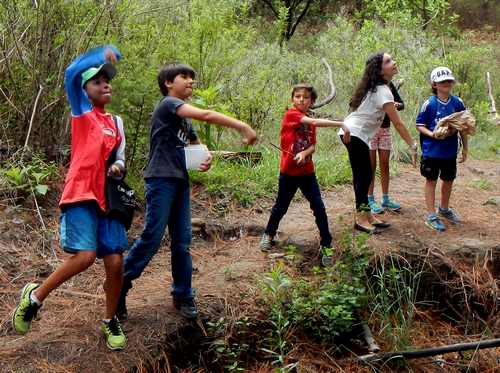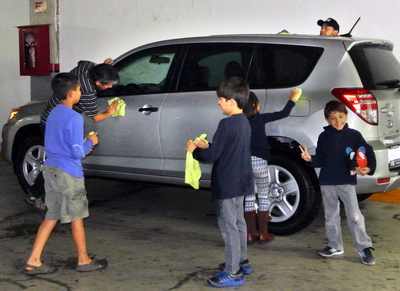|
By John Pint
 Members of
six families whose children attend the American
School in Guadalajara, Mexico, gathered together recently to hike
along a 2.2 kilometer Nature Trail laid out by rangers in the Primavera
Forest, located just west of the city. All members of the group were
carrying bombs, but not the sort that cause destruction. Members of
six families whose children attend the American
School in Guadalajara, Mexico, gathered together recently to hike
along a 2.2 kilometer Nature Trail laid out by rangers in the Primavera
Forest, located just west of the city. All members of the group were
carrying bombs, but not the sort that cause destruction.
Just the opposite. “These are called seed bombs,” explained trip
organizer Stefanie McGrath, handing me a hard brown ball about an inch
and a half (4 cm) wide. “They're made of clay mixed with the seeds of
the milkweed plant,” continued McGrath, “on whose leaves the Monarch
butterfly lays its eggs. Unfortunately, the numbers of Monarchs are in
serious decline because of deforestation, agricultural spraying,
urbanization, fires and climate change. So we've come to toss our seed
bombs in an area where milkweed plants have a chance of growing and
someday providing food for las monarcas.”
McGrath went on to explain that this was a hands-on project of seven
local families for promoting pollinator plants for bees, butterflies,
bats and hummingbirds. “It's the first time we do this,” she said, “so
we had to learn a lot of things about how to make the bombs correctly.”
They were able to get the seeds from a government-certified resource
and they obtained local, natural powdered clay from potters in
Tlaquepaque, which is famous for its arts and crafts. The families then
gathered together several weeks ago to make the bombs well ahead of the
start of the rainy season.
I asked who came up with the idea of this project and learned it was
Stefanie's daughters, Carlie and Olivia. Olivia told me, “We were
looking for a project that would help the environment and I thought of
the milkweed plants we have growing at our house and how much we enjoy
watching the caterpillars turn into butterflies.”
As we began our hike along the edge of a steep drop overlooking the
forest, I heard someone in the group mention that seed bombing was
their 14th project.
“Well, tell me a little about the other 13,” I said.
 A shy little girl named
Kiran spoke up immediately: “One of them was a
waterless car wash project. We used a special soap that doesn't need
water.” I learned that this project took place a year and a half ago
when the kids washed cars using a special technique employed by
Ecosquad Carwash, a small business in Guadalajara where you can indeed
get your car washed with a harmless, biodegradable product that uses
almost no water. A shy little girl named
Kiran spoke up immediately: “One of them was a
waterless car wash project. We used a special soap that doesn't need
water.” I learned that this project took place a year and a half ago
when the kids washed cars using a special technique employed by
Ecosquad Carwash, a small business in Guadalajara where you can indeed
get your car washed with a harmless, biodegradable product that uses
almost no water.
A boy named Rodrigo added a comment: “With the money we got from the
car wash, we hired some plumbers, and then we went from house to house
in Zapopan asking people if they had leaky faucets or water pipes...
and the plumbers fixed them. It was a project to save water!”
In short order the rest of the children started telling me about other
projects this group had done. They participated in a soup kitchen and
cooked meals for kids whose parents work in the street. They cleaned
trash out of rivers in Colomos Park. They did a project to get street
dogs adopted. They put on a show in a hospital which performs
operations on children with cleft palates. They held a concert for the
benefit of disabled kids in an orphanage. And their very first project,
I learned from a boy named Arun, had occurred about four years ago when
they raised money and sent it to India to fix two water pumps and build
a new one in communities that had no water.
I was astounded. “You've done fourteen projects like these?” I said.
“How did it all begin? Who started the first project?
“Arun,” they all said.
I asked Arun what had inspired him and discovered I should have asked
who.
“It was Craig Kielburger who inspired me,” said Arun. “He gave a
presentation in Guadalajara at the end of 2010. After listening to him,
I talked to my mom and she called friends and we started with maybe
four families and we named the group, 'Help the Children, Please!' Now
we've done fourteen projects and we are growing.”
Little by little I learned that Craig Kielburger is a Canadian who, at
the age of twelve, had been profoundly impacted by a news story about a
boy in India who had been sold into slavery at the age of four and had
been chained to a carpet-weaving loom for six years... and had been
murdered—at the age of twelve—when all of this came to light. Craig and
eleven other teens organized themselves as The
“Twelve-Twelve-year-Olds” and started a movement called Free the Children,
which grew and grew and now mobilizes 2.3 million young people around
the world. Kids helping kids have managed to get over 650 schools built
and have provided over a million people with clean water, health care
and sanitation.
Our walk eventually took us into a cool, damp arroyo where there was
moss on the rocks and ferns everywhere. “This is the perfect place for
milkweed,” announced biologist Jesús Lepe. “Bombs away!”
The clay balls flying through the air somehow seemed symbolic to me.
These children and these families were sewing seeds of another sort
with every new project of theirs. I have to admit it, meeting them has
given me a new perspective. I think there's actually hope for this old
planet, after all!
WHAT CAN YOU DO FOR A BETTER
WORLD?
Looking for ideas?
Perhaps you'll find one among the 14 projects
carried out during the last five years by “Help the Children Please!”
(List
courtesy of Geeta Pandey)
1) Building and
repairing two water wells in India, by raising funds
through bake sales (goodies made by the children).
2)
Helping Instituto Freire de Guadalajara. This is a school for
handicapped children. Our kids made paintings together with students
from Freire, then auctioned them to raise money in order to buy
educational material for the institute.
3)
Project “Cleaning up Colomos!” Parents and children got together one
Saturday to learn about the lesser-known areas of Colomos and help
remove trash from the small rivers and green areas.
4)
Providing children of El Oasis orphanage with a day of fun, games,
food and much needed new mattress protectors. Ozzy Juegos donated their
time to provide entertainment.
5)
Each family chose to sponsor a child at Sueńos y Esperanzas
Orphanage for a year.
6)
Raising awareness of proper pet care and promoting the adoption of
street animals in Guadalajara. This project won a nation-wide science
competition at Puebla, called Codigo Ciencia.
7)
Helping abandoned children with cerebral palsy at “Hogar de la
Caridad Bienaventurados de Jesus,” by selling tickets for a kids'
violin concert. We were able to provide them with one month's worth of
diapers and medicines.
8)
Supporting patients and their parents post-operatively at Operation
Smile. Our kids performed magic tricks and read books to the patients.
They donated food to the tired parents and small toys to the children.
9)
Raising funds and awareness to help the WWF`s efforts to save the
Mexican vaquita porpoise from extinction.
10)
Providing Christmas gifts and enjoying a typical Mexican posada
with the abandoned children at Fundación para el Apoyo Institucional y
Aldea Infantil.
11)
“A Drop per Second”: Saving water in Guadalajara, by promoting
Ecosquad`s water-free car washes, distributing flyers with water-saving
tips, free buckets and pebble-filled water bottles to place inside
toilets. Three plumbers donated their day's work fixing leaks for free
around Zapopan.
12)
Auctioning art work to support Freire Institute again, this time to
help them move into a new building.
13)
Soup Kitchen for kids from CODENI, an organization that provides
education, health, etc. to children of street workers. Our kids bought,
cooked and served food to Codeni kids.
14)
Seed bombs at Primavera forest, in an effort to help increase the
number of monarch butterflies visiting our area by attracting them with
pollen-rich flowers.
|

